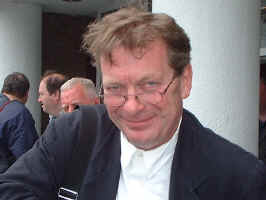
Tony Wilson
Here's Wilson's Wikipedia entry.
Anthony (Tony) Wilson (born February 20, 1950) is a British record label owner, radio presenter , nightclub manager and journalist for Granada Television, on which he hosted the rock program So It Goes. Wilson saw the Sex Pistols at the Manchester Lesser Free Trade Hall, in June, 1976, an experience which he has described as "nothing short of an epiphany" [1]. He booked them for the second series, probably the first television showing of the then-revolutionary British strand of punk rock. He later founded the record label Factory Records and the Haçienda nightclub in Manchester.
Seeing a production of Hamlet extinguished Wilson's ambition to be a nuclear physicist. He graduated with a 2:2 in English from Jesus College, Cambridge.
He was the manager of many bands, including A Certain Ratio, The Durutti Column, and the Happy Mondays, and was part owner and manager of Factory Records, home of Joy Division (latterly New Order) - the band managed by friend and business partner Rob Gretton. He also founded and managed the Hacienda (FAC51) nightclub and Dry (FAC201) bar, together forming a central part of the music and cultural scene of Manchester which was recognised internationally as a hotbed of exciting music. The scene was termed "Madchester".
Wilson originally sought a career as a television journalist on Manchester's local station, Granada TV, where he worked as reporter and anchorman. He eventually returned to the career and the channel in the late 1990s, where he still works. He never made a fortune from Factory Records or the Haçienda, despite the enormous popularity and cultural significance of both endeavours. Both came to an abrupt although not necessarily premature end in the late 1990s, the Hacienda being forced to close because of the out-of-control ecstasy problem at the club: the club never made profits because people took ecstasy instead of drinking alcohol.
A good interview here.
After playing its part in one youth culture explosion, Factory was also immersed in another at the arse end of the 1980's. Acid house was in effect, the lines between rock and dance music were blurring and before long Manchester was popularly coined as 'Madchester' where mad-fer-it kids danced freakily, sported huge baggy trousers and adopted the swagger and street suss of bands like The Happy Mondays.
What set The Mondays apart? "Someone had to take Black American music, add irony and English rock," constructs Wilson. "They did it and everyone f*cking copied them," he asserts. "3 months later you get 'Loaded' by Primal Scream and 'Fools Gold' by Stone Roses and everyone is like 'Oh my God the World has changed.' It was the Mondays that did it." Calling on a witness, he cites the Daily Telegraph: 'it was the rhythm section: the bass player and the drummer; Paul Ryder and Gary Whelan changed British music forever.'
"Joy Division and New Order are quite rightly considered the top 30 or 40 bands ever and The Mondays aren't - that's wrong. As if somehow, Shaun, hiding behind his genius, writing for the Daily Sport and appearing in photos with crap bimbos, detracts from his genius." Not that this affects the belief of his former label boss. "There is no doubt that there are four LP's, a bunch of other songs and its one of the greatest collections of pop and rock and roll songs that belong to anyone.."
And the semi-factual film 24 Hour Party People: worth seeing, if only to watch Shaun Ryder's zestful reenactment of "poisoning pigeons in the park."


1 comment:
I edited ManchesterAD.com when we ran that Interview, and 'hung out' (briefly!) with Tony during the filming of 24hr party people. I was also involved when started up music33.com, which was a pre-cursor to Itunes that launched back in 1999 then sadly passed away a few years ago (This isn't mentioned in the Wikipedia article).
Tony was an all-round nice guy who helped bring Manchester to the attention of the world.
There's an excellent article at
http://www.techno.de/mixmag/ about Manchester gangs that mentions the Hacienda.
Post a Comment